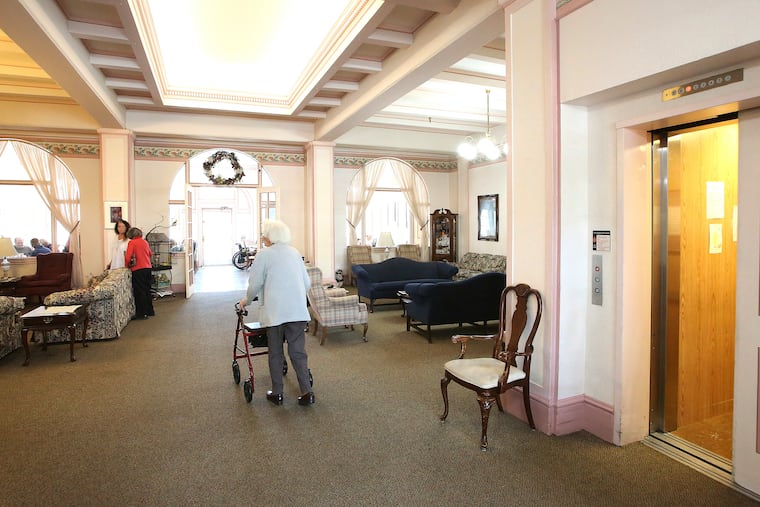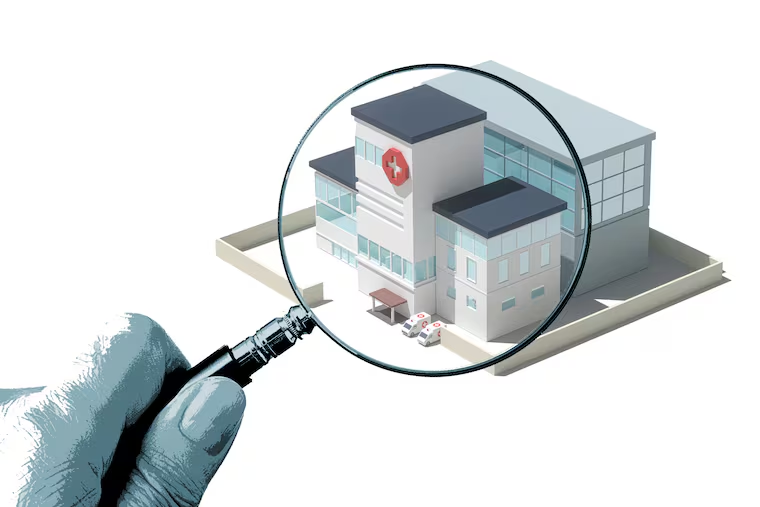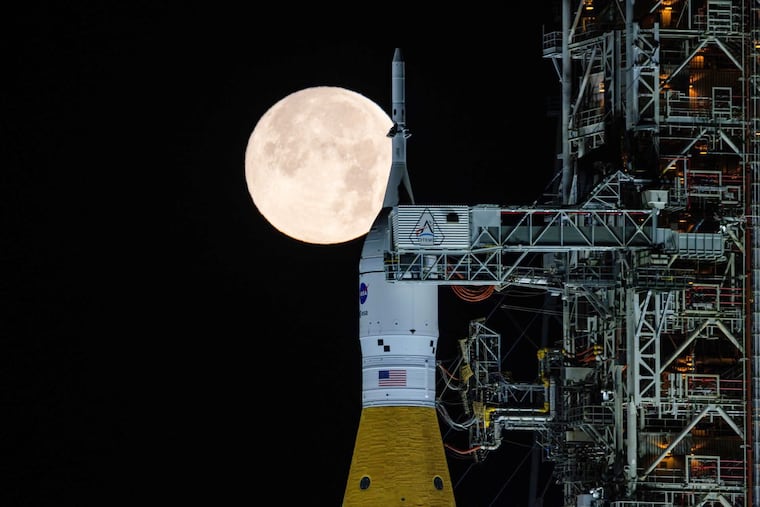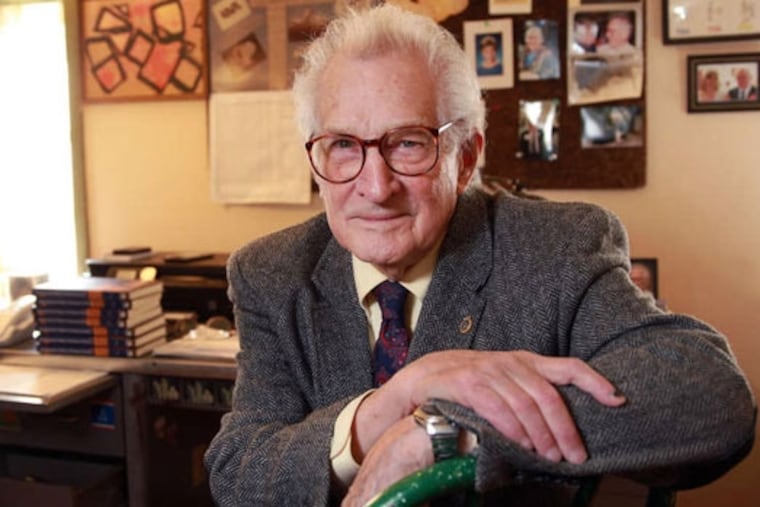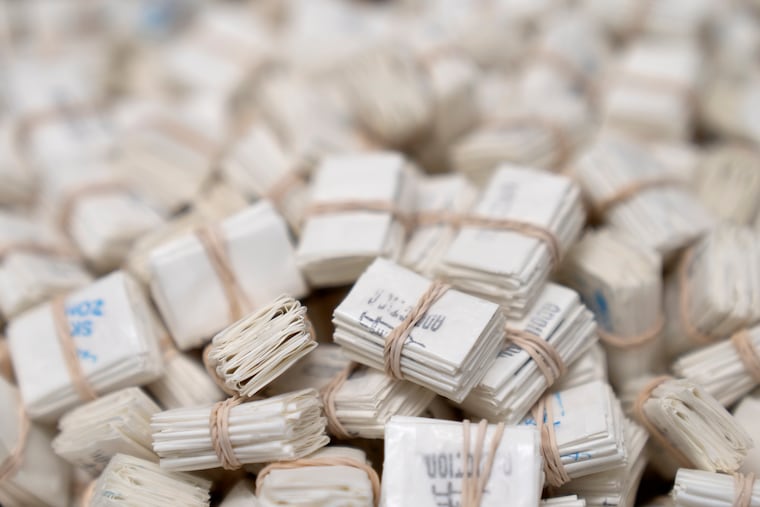Skip to contentPaula Span, KFF Health News
Joanna Fong-Isariyawongse, The Conversation
Barry J. Jacobs and Julia L. Mayer, For The Inquirer
Joanna Fong-Isariyawongse, The Conversation
Joanna Fong-Isariyawongse, The Conversation
Barry J. Jacobs and Julia L. Mayer, For The Inquirer
John Lin and Jalpa Doshi, For The Inquirer
BriarRose Edwins and Hayley Goldner, For The Inquirer
Layla Bouzoubaa, The Conversation
Marcia Dunn, Associated Press
Adela Suliman and Kasha Patel, Washington Post
Marcia Dunn, Associated Press
Adela Suliman and Kasha Patel, Washington Post
Noah Robertson, Tara Copp, and Ellen Nakashima, Washington Post
David Ovalle and Cate Cadell, Washington Post
Geoff Mulvihill, Associated Press
Noah Robertson, Tara Copp, and Ellen Nakashima, Washington Post
David Ovalle and Cate Cadell, Washington Post
Geoff Mulvihill, Associated Press
{"ENV":"fwVdQVoxfwZVBWAHXRxaBHxzc110MXhCfmYMCg==","CONTENT_BASE_PROD":"aGBeA1guXQR+YEkBdj5wA3xwaEBjDGNdf3NoB2Acc1x/cHxPYBx0TH9jeEB2InBPf3NjXmAcc1xrWnRAdxx3WHxjfEB0MnRMf3BrW3chYEx/c3gGdzJ7WXxaaAR2MWwBa2B3X2Mhb10=","ARC_ACCESS_TOKEN_PROD":"fnAER1oid11TBUVOWiJkA39wZEB3HHNZfHNgTXciY158XWhPdCJzX3xgYAdgMmddf3NWBncMdE1/XVJOdzJ4AHxzVVt0InhPf1p8Bncyc1l8c3xNYFR8AHxdYE53DHtcfGBrWmAcYE9/Y1laYyJwAHwFe153DHNda2BoQHcMdAV8Y3dedzJWAXxwY1tgHHQGaF1oQHYicE98cGhNdiJ3Xn9waAZ0IWBCa1pjWnchf19rWmNaYyFsAWtaZEB3DGdYaF1jW2MieE98c1leYzFsTQ==","GRAPHQL_KEY":"UF1zA2NVWQdScGQDXDJWA3xdVgd2MntZfE1WBWMxbEx8XVZPdBxWB3xNcEBgHHgGfGN3WnYye1hrXVpOYyJ0AGtjdAd2IngGf2B8QHQiYAFrWnRAdyFgAXxzaAd3C2AFf2N8T3c3CAg=","GATEWAY_URL":"VGNoBl0cUQNoBQQBXRxaBH9jZE93MXxNa2NjX3QidEJoY3QHdCJdWHxzcAZ3InQGa11gT3ciUkJrXXQCYzJ8QmtjY19jDGAHf3B7W2MLb1x+cGROYzJsCA==","GATEWAY_SLS_URL":"awVdBl1UWU98cEFZdwxSA39weEBjMnNcfGBkT3cidAB/Y1pPdCJwBGhddAd3InBNfF18B3QcdAF8YHxAdjF/X3xgZAZgMX9df1p3W2BUYE1rWndbYwtjXw==","FEEDS_URL":"f39jAlsid1hVWnsHdyFSA3xjWVp3InBNfHN4B2Mic1l8Y1ZPdxx3Xn9zeE92MmdYfE1wQHQyc1h8cGRPdwtsAGtjVVp0DGwFfAV4B2ALbAF8c2BNdjF8BWtjUk12MnwGfE18BWMxbAFoY1lbYyFjXnxwaAo=","RESIZER_KEY":"aFprWlsIZAZTYHtFdxxaBH9de1x0MWBCaE1VXXQhZE9/XXxOdAxkBHxjcAJ0VGBNf01/XXchf1x/XXAFYzFsTHxNYAZ3HFlZfGN7XXQxe1hrc2gGYwtnWHxzeARgC2NZaF1wQA==","GOOGLEANALYTICS_ID":"fG9wT2MudwB/YARDYAtWA3xzYAZ3HHQAfF1gT2AMZ1l8c1oGdCJgBn9wYE5gDG9d","TWITTER_API_TOKEN":"UllaB1gMUV5+b2QCdgx8AXwFdAV2MnhMf2B/W3ccY198YHwEdCJwBXxdXV53In9df01STWALfAB8cHwFd1RsTXxzUgRgMn9faFp7W2AMY1x8cHgEd1RgTH9jVgZ3VGBMf2BjW3QxfAd8WmNeYzFvXGtjc152MnRNaF1rXXcxcEx8WmQGdDJ3XWtdWV9jMWNcaFp0T2MiYEJrc39fdCFkQmtwfAd3VGQBaF1dW3YyZE9rWnwCdzFjXWhNVgJ0C2xNfmNVXWBUfE9rY3NfYyJ3XGtjf19gDHAFf3BnXHYyWV5rYGtfYAtgAGtgY190HHRCaGNzXHRUcAVoXXtfdwtkTWtjaAd3C3gAfmN7WmAMWVxrcGQCYyFkBHxzfAJjC3gGfmNzXWMyXV1rc1oCdwtsQmgFdAN0MXgE","GOOGLE_CLIENT_EMAIL":"VXB/QmNURk9oYHtPdjJaTWhjcAV0IXgFfmNjXXcxZE1+c3QEdDJeBX5zdAN0IlJMa2N3XXQyY1x8Y3QEYzF8Qn9NcAR0VHBNfnBnXnQMcEx8XWhPdAt8TH5ga193C3BPa3BkA2Myf1l8WmgDYDFwTH9gZAZjC2wEfGBrX2MMf1hoYGgCdFRzXGgFfE50HFlZaF1aBmMydE9+c3wFYBxRX3x2DAo=","GOOGLE_PRIVATE_KEY":"VV1dWmNVZwRoWVlOWjFeA38FaE9jMmAHf3B8QGAyY118c1JNdBx8TH9zZE12Mn9dfGB4TXYie118Y2hPdwxjWXxddE5gHGAGf2NoTXccUV18XXAGdiJgBnxda1t3InNcfHBjWncLY158YH9fdDJzWH9geE5jDHwBa11WT3QycAdrXXdddDJkAX9gY1p2IWwHfHBoQGAyc1h8c2ROdDFjXXxNaE13ImAGaE1oQGBUbAF8c1JPYwtsTWhNd113VGRPaE10AnQMeAZrY1ledDF4B2tza1pjMXgBa2NoTncLfAR/cGdcYAt4BGtjf1p2MW9ffGBrXXdUeAZrYH9bYBxdWGgFa113MXgBa2NjXndUfE1oXXtedjFzXGtaeAZgVHtca3NzX3RUZ1hoTVVddwtnXWtje110C3AAa3NZXHcLbEx+Y2Nfdwt8B35je112Mllfa2NWA3QcWVh+cHdeYAt4AH5jUgJ3DH9YfF10B3cif19/c1IHdAx4BnxweE9gMWxNa2N4QHcie1x8BXQGYzJ4TGhaYE10InAEa11kB2MicE1rWmhPdCFsBnxNYEB2MXBNfFp0T3YidABrXWhPdCFvXGtaaE93HGBCa2NVXnQic118BXtcdzJ0BmtdcE10DH9ca1poT2BUZ15/XVZPdDFsBmtjc1tgVHgHa2NjW3QyZ1x8Y3tbdyJdXmtjVVtgC3hNaAV8T2ALe1l8c2NcdzFgBmtwf19gC2QHaAV7W3QxYAV8TXNcdzFgQmtjWV1gC3wFfmN7X2AcdExoTXdedjFwBmhaZ112IXtZa3NZXncLbAVoTVVadwtgB2hNVV50IXtYa2N3XXcLf1lrYHtbYBxSBGhNe193MnddaGNzXWMLc11+Y1IDdCF7X35wfAN3IWdYfnN3XGMMUgVoY39adDF4AGtjY11gC2BPfnBkTXcyZ1l8c3BNdBxkAHxzaEB2ImNff3B0BmAycAR8TWgEdiJ0B3xaZEBgMnRMfHNwT3cifAR/cHxPdyJzXXxdVk12IWAEfHBgTWAceEJ8YHRAYDJvXXxjfE13InABfFpgBnQcc19rWmNbYAx4BmtadAdjInNefE1aT2MMfEx8BWtbdjJ3XGtjVV13C2NeaF1wT2ALeE1rWntcdzJzXnxNe1x0VGddaAVrW3QyUgFrc3tcdwtkTXxga1p0IWNda11kQHYxYE1rc2tadBx7XWgFe1p3C29da11zXWBUZE98cH9cdAtnXn5zc1x2IXhCa2B3W2AxY15rY3tad1R8BWhNf1t0MW9da1pkA3ccdARrY2NedjFgB2hgd1x2MXgGaGBkAnYhcAFrcHtbYyJeQmhjWV5jC2dea1pnXnQcWV1+Y1ldYAtwBGtwa11gMX9caFp3XnQLf1l8cGBNYBxWT3xNdAV0DHQFfF1wTnYieAR8TXxPdAx4TH9aYAdgHHxMfF1oT2Mye118TWdadAxgB3xwZE10HHAGf2NaT3QLbE98c2QHdDJ4AGtdfE5gMnQGa1p0T2Ayb1h8WnxPYzJ/X3xzd1p3VGxPa117XHYyd1xrc3tfYAx7XHxwY1tgVGBNaE1nW2BUY15rXXdcYAtvXn9waE9gMWxCfHB8TWMLYEJrXXxAdwtsB2taa1t0C39caE13X3QLb11oTWtbYwtkT3xweEBjIWNdfHNdX3cxYEJrYGdbYDFgBGtga150VGABa2N3X2MLZ11oY39ddCJ0AWgFZ1xjIWwGaGN3WnRUZABrWmQCdwtvX2hNXV9jMWQBaE1aA3dUYAVrXV1eYFR/XWhNXVxgC3NYfnN3X3QxY1l+c1VcdFR7X2gFY19gC2QFfmNrXXYyXVlrWmdfdAxgBHxgdAd3HHNcf01kQGAcZ1x8BXtbdyJkAXxde1t0ImQBfAVkT2AMc198XXAFdyFjXGtjUk12IWwFa2N0T3cMf19rXXdbYAxzXH9dcE93HHRCa11nW3cMdAB8cGBAdzJgBWtgY1x0HGRNfGBrWndUbAF8YHRAdzFgBGtjXVt0DHAAa1pjX2MMc198TVVaYwtkTWtdWVp3C2wBa3B/W3QMeAd/Y2tbYAx/XmtjZ1x0VGRPa1poTXdUZE9oTWNbdjFwTWgFd1x2MXgBfAV3X2MxeAdrXVVadDJzX2tjc1pjIWRPaE17WnRUZ11oY39bdAt4BmtdWVt3VHwGfmB7XHcxf19rYHtddDFkBGhdcAJ0IWQHa11ZXWMxZ1loY39cdDFvWWhjf11gHFlYa3N/X2Axe1lrc1IHdFRwQmhde110HF5CaF1WAmAxcARrYHtfdwt4B2tdUgVjDHNZfHNWT3QMbAB8BXxOdAx7XHxweEBgHGNdfAV8BmAMf158Y2hAYyJ8BXxzcE9gMnwBfAV0BHcydAZ8cGNadBx3WXxjaE13DH9dfGNaT2BUYE1oXV1bdjFvX3xaf1t3C29cfFp4QHcLY1lrY3tbYyJgB3xwa1tgVGwAa2B/WnYyd1h8c3BAdAtsTWtgfAJgVGNda2NwQHYhZ15oTWhAYyFvXWtgY110DHNdfwV7WnRUbEx8XXtddFRjXWhNVVx0IWQGa113XWMhfABrY11aYDFsQmgFa1x0C2AEaAVgT3dUZE9rWmdfdAt4BWhaa153VHgBa2N/XXcxfExrWmdaYzF8TH5wd110DHdeaF13XGMLZE9oY2Ndd1RwBWhdWV5gMWBNa3NZX3QLZ1hoBXteYyF8BmtzcAJgC2RNfmNdXGMyXV5oYHgCdwtjXWgFfAJ3MWdcfGN0TXcMUV5/Y2gEYwxwTXxzdE52InRCfGBoT3QMZ1h/TXBNYAxkB3xaZE9gMntefE18TnYieAV/cGhOdjJwB2tjYAd3HHdda11kTmMLb1xrY2RNdDFvX3xjaE9gMnwAfGN3XXQLb1xrY39bdyFsTGtjWVpjIWBPa11zW2AyZAF8YGBPYDFgT2tjdEB3InRMa3BnWnQxeAVrY3gHdzJzXnxja1t3IW9fa11rXWAxeAFrcHhNYAx8AX5jf1t0IWxPa2NwQGMxZAd8c3RAYwt4TGhjXVx2MlJCa2BjX3RUYEJrXWNfdzF4TWhaZ1p0MXhPa2NVWncLc15oWn9cdiF/XGhNWVt3VGRNa3NnXWAxe1hrcHtdYDJSBWtzZ1x2MWQGa11VXGMxe15rcGdedyJZXmhgeANjC29ZaF13X3ciXkx+Y2dddzFkBmhaY150DF5Ma3NdXmMMYAB8XVJNYBxkBXxjcAZ0HHhNf2NoT2AMZ1l8BWQHYBxWAXxwZE9jMnNZfF1WTWAMbAd8BXwGdwx0BnxaYEB3MnQFfGNwT3QcdAd8TWgHdiFjWGtjWVp0C2NZfGBoTndUb118XWBAd1RsBX9dVVtjIXgHa11oT2MheE18YGBPdxx8AGhNcE93MXNcfF1jXWAMd1loTWdddjJ0QmtzZ1x3DHQEaE1nXnQcd1h8Y2NbdiFgBGtjeE9jMnxCaAV/XHRUe1l+Y1JPdjFkB3xNWV10InNffHN3WnQLeAFrc39cdxxdX2tdc1pjMWxNa2NdXnQxcABoWmROYzFkAWhae1p3C3tZaE17XmALYAdoWmdcdDFjWWtzWVx0MXNeaGN4A2BUb11rYHQCdwtkBH5gf11gC3wHa3NSQGBUY15oBWQDYwxZWGhNWV13IXABaE17XXcxcEJ+c2QGdDJ0QnxwdE13ImwBfGNoBWAydAd8XXRPdzJ/WX9we1tjMnwFfHNWQHcMY118Y1ladDJ4Qn9NdE5jIX9YfGN0TWAMdE9rY2dadBx/XnxjYE92InQBfGB4BXchbAd8YGgGdCFjWWtdfEB0InRMa11VWmBUb1l/BWhNdBx4AWtje1p3MWwHa11dWnQcZAZrXX9bdDJeTWtzZ1pgHHBMa2NjWmMLZAR8c3daYzFjWGtddAZ3VHteaE13XXQxZE18TXNddDFsB2tae1tgC3tfaFp3XWBUeE9rXXdbdyFvXmhNeEB0C39daGB3W3cMUkJoTVVfd1RwBXxad1tgC3NcaE1jW3QhZAdoWmtadFRgQmhdf193MWNZaE1WAmMLfE9oBXtbd1R4AH5zc1x0DF1ZaF1rXncLZE1rc2NddDJeAWhNc192MWwBfnNnXnYxbAdoY2NedAtwTHxjeE13In9dfE10QGMyc198BWRAYzJsBXxdaEB2MnNYf2NgQGAMfAV/cGBNdyJzXmtddEBgDGQEfHBrW3cMf19rY3BPYBxjWXxjUk1jMWNYfHNgQGAyf158c2tbdAx3X3xae193MWxPa2NSQGAcf1lrY1laYwxwBHxwYE93VGxCf2NaT2MMd1x8Y3BPdjF7WXxzZE93VGxNaE1dWnYiZ1l8TVVdYDFvWGtwd1x3C2ABfHNnXXcMc1xoTWNfdiFsT2taYE1jMXgGaE1/WmMhfEJrWn9fYAt/X2hjc1p0C2RCfHN/XmMLbAFrY2NbYDF7XGhjXVx0VHBMaE1VWnQLfE1rcH9edAt4BGhjfEBjIXAFa2B3XHYxb19oTXNfYFR/XmtjY190C39ZaE17XHchZARrY3teYAxwQmhNf112IWQAaGNgAndUe1xrc3tbdyFvXWhjY19gHHBCfAVkTmMMd15/TVZOdyJ8B3wFdEB0DHBPf01gB2MiY158Y2dadyJ8BnxzcEBjIWxPf2BoTnQxY1l8Y1laYAtjWXxdYEB3DHNYa2N8T3dUfExrXWBAdFRgAWtjf1tjMmNffGNZWmAcdEx8c1ICYAtsBXxzcAdjInQBa1prWmAydAR8c1lbdDJ3XWhjd1p0IXgEa2NZXHcLYAZrc3dcdDF4BHxjWVxgDGdca2BgT2AxY1hrcHRPYDF4TWtza1t2MWAEaAV/X2AMe19rc1VadCF7WGtwa150C2RCa2NZXGAycE1oXVlcdDFjWWtaf1t3VHxNaGNZW3chf1lrc11eYDJZXGgFZ150IXwBa3NjWnRUc15rYGACdBxdXX5jeAN3MWABaGNdX2MhZEx+c3wCYDF/WWhaZ1tjDFlefnNgA3Yhc15+YHwCdjF8AWhja150MXNefmBgQHciVk98WmBOdAxwTHxdfE12InwGfF1gT3Yie118cGQGdCJ/XHxdYE13MnQEfGNSTmBUb118TVJAdBxwBH9dcEBjDHRCa11dWmMMeAV8XWROYyFvX3xgY1t3MmNdfHNWBmMicE9rYGBNdjFgTGtjf1tgC3hNa2NrX2BUYAV8c2hAdAxwTXxzaE90IWRNa2B7XGBUbE1oY1lbYyFgAGtgZE13InAAa2B7WmALYEx8Y2NbYyJZXHxNcE9jIWdYa2NzX3RUZARrc39cYAt4BHxafAN3VHAFa11/W2MxY15rWn9dYwt/XWtgd1x3VHwFa1p7XXdUY1l8c2NcYDFwAGtgf1x2IXAEaGN/X3QhZAB+c2dfYyFnXGhge1x3IX9eaGNdWmMhZAdoTVoDdCJSQn5zXV10C3NcfGNkAnchfAB+c39cYDFzXGtzVgNgMWdYaGB3X2MLfAd8TVpAYBx7WX9gdAVjMmdffHBoTXQcf198XWgGYwxkBXxNaE13MlZPfGNoB3QMdAB8WnhOYAxgBXxja1p3IndcfFprW3cyfAdoWmAGYDJwBGtja1t3VGAGa1pkT3Yyc1xoTVpPYyJgTXxNdE93MnAEfFprWmMie15rY1ZAYzFvWWtdaAJ3InNea2N0TmMxY1hrY1VbdzFsBWtjcEB0HHQBfHNST3Yhb1xrY39ad1RwTGgFZ1xjDHdffGN8QGMiUkJrc1ldYwt7WWtzXVt3MWRMaE10TmALbE1oXWdfdCF7WXxwd1xjMWdeaE1jXHYxZAFrXX9bdAx3XX5jWVx0VGwBa3NnXHcLc19rcGhAdiFkB2hgZ1x0MWNZaGNVX3YxfABrXV1eYAt4T2hNc110MXBCaE14A2MxYE9rc3NedjF4TGtwe11gHFlfaE1rW3cyWV5rc3gDYzJwBHxjZE90HHwBf11kTXYyeAB8WmRNYwxWTHxjVk92Mm9dfFpkTWMMfE9/WngHdwx8AH9wY153HGAAfGN4TmMMcAR8XWhPdiJzWX9zfEB3HHNcf3B4T3cyf1x8YHhPYDJgB3xgaE92InxMfAVoTXYybE18TWQK","BLUECONIC_ENDPOINT":"fnNaB10+f0xTcEkGY1V0A39waAZ3DGNcf2B4B2AydE18c3hPdjJzXnxjc1p0Imdff01WQHQLbAZ8c3dadBxzWGtjY1p0DH9da118QHccUV9/XWdbdyFvWGtaZAZ0VGBC","BLUECONIC_STORE_ID":"aARZXF0yUU1QYFkEXCFaA3xzeE93HHQGf3NwBnQMeEx/YGhAdwxnXnxwZAZ3HHdfa1pkTncyeAZ/TWBAdCJjWXxgdEB3IndZfF14TnQMeAR8WnhOdyJsTHxNeE93HHgFfE1WTmAye11rYH9adCJ4TQ==","BLUECONIC_KEY":"UHBdWFsxBEZVXX9dXQtgA3xjWkB3DHNcfHN4B2AMcAZ8Y1YGYBEICA==","BLUECONIC_SECRET":"a2B4B2MyUQFUb3NadFVkA3xNdE10DFYHfGN4BnQMd198cHwHYAx4Qn9zWk12IWAFf3BkBXQMeAR/Y3xAdFRsQnxNaE93Imdca1prWndUY1h/XVZNdyF8T3xNZAZgDHBPa2BgBncnCAg=","AMP_AUTH_BASE_URL":"VFpFTncxXU9TY1oFWwxaTXxgZ150IXAEfF10BXQhbE1oTWdbdCJ8Qnxaa150MnRPfHNwTmMxeEJ+c3dadCF7XH9ddE10HHwEf2BoA3chY1l8Y3ADYwtnXH9daE1jMmBPaAVrW2MMb1x/WmtcYwxnWHxjUgd3MmdYfwVkT2Ace158BXdc","AUTH0_DOMAIN":"U2N/QFwyZ0JQTWNYXAtkA3xzfAZ3DHBMf2NST2MicAZ8Y3QGYAxwB2tdWk90HHNdaF1oQHcMdAV/c3RAYBxwTw==","AUTH0_CLIENTID":"U2NVX3cMZ0JSYFVNdAtgA3xzZAdjImAFf114BnQcfAd8YGgGdiFsQn9dfEB3IndefGNwBmMydAB/WmdadjJwTXxzcE5gHHdcfHNSTmAxfEJrY3wHdDJsBWtdUgdjDHAHfGNkB3cRCAg=","PIANO_ID":"VWNZB2BVdwBrYGgGWjFGA3xNUgZjDHgGfHN8TXQicAZ8c3BAdyJnXXwFYAo=","MIXED_CONTENT":"aAVVWXQxWU18c2taYD5wA3xwYEB0DHQEfGBoBmMic1h/c2QHdwxzWXxwdEB2InBNf3NdW3QcZExrYHhAdBx0B39zWk9jImNdf3BrW3cLY1h8YGBAYBx/WHxaeAR0IXBMa11rWncxb10=","VIAFOURA_SITE_UUID":"U29nR1gIcABVc1kCWCF4A3xweAd0MmNYf2N8T3ciYEx/c1ZAdDJwBXxdcAZjIn9ea118TmMif1l8TXQEdAxkT38FYE10MnBPfFp4TmAce158XXhNYzJ7X38Fd1p3HG9ffFpgTXYieEJ8TXROdCJ4TQ==","GOOGLE_CLIENT_ID":"f39/WVgcWV98WlVBd1V8A39gdE93DHQEf3NkT2Myd15/YHhPYAxzXX9gdE92IXwHf3BjW3cLY11/cHRPYBxnWHxjWk90DFZPf3B/XmMLb1xrYH9bdiJRWWtjZARjC2NefAVnXmMyfEJ/WmROdwtvWHxzXV5gVGABaFp/W2MMd11oYGdbdyJgQmtzVVt2IXtdaGNrXWAcYARoTWhNdjJjWWtzcAJ3InNYfGNjXGAMY11oTVYHYzJwT3xjUgd0InRNf3N8QGBUeEJ8YHwHdyJzWQ==","AUTH0_BASE_URL":"VHNVW1gIYABSXWNOWiJaBH9zZEB0IXxCfE1wA3QiYEJ/XWADdCF4QnxNY1p3MXxMfGBkA2MMcEJ8WmgDdyF7WHxNc1p0C39caF14B3QMdEJ+Y2AFdBxkBnxga15jMnNZaAV0TWMMf1lrZgwK","CHARTBEAT_DOMAIN":"fnAEA3cxWgF/Y2daWi54A39jaEBgDHNdfGB4B3QcY1h/cGgGYDJwAWtdfEB3ImdY","G_OPTIMIZE_CONTAINER_ID":"aAUAR1gMeEJQcGcBWAh8A3xNaE50HGAFf2NwTXYybEx8TVoGdwx/X3xzeE1gEQgI","G_TAG_MANAGER_CONTAINER_ID":"UFlrWGBUBFlTcEJPXAteA3wFZE1jMngAfE1kBHQceAB/YGBNdiJvWXxaaAo=","SF_CLIENT_SECRET":"Uk17Alouf01/TXACdzJaT3xjcAV0VHAFaGN0B3chfEJrY3NddxxWBn9NfAV0IXhNf01jW3QMdE98Y2gEdwtsBmhdUgV3MXwHf3N8TnQcXk9rY3RAdzJWB39NdAV3DGxMfE1oT3QxYExrY3dedAxgQnxdZAJ3MWQHa117W3cLYE18TXdbYwtsQnxdZAR3MmQEaE1kAnQxYAV/cGRPdCJ4TX5zcAN3IlIFf01gTXciZ15+c2daYwt4QmtQDAo=","G_RECAPCHA_V3_KEY":"UFl/XloLQQNUb3wGWghwA3wFdE12MnNcfGNwBWMic158XXxOdDJgBnxNfE93IngGf2B4TmMMf1l8BXxPYwx4QnxjfAZ3HHdcfE1ZW2MhbABrYHRAYDJ3XXxdZAdgDHBCf2NwTmMidAZ8Y2ROdDF4Qn9jVVtgHHddfF1SCg==","G_RECAPCHA_V2_KEY":"fn9eB2NUY0xUb1IGXVRsA39NeE9jMlFZfHNkTnccdEJ8YGBOdyJgTXxjYE10MlYEf11gBWMMe1l8c2hNdCJ4BXxwdAZ3MngEa2BgBnQMcAV/c2dbdwx0B3xaYAdgDHAFf2NwTnYicE1oXXRPYzJeBXxdZ1t0DHRMfF1SCg==","GROWTHBOOK_CLIENT_KEY":"fFpdWlohWU1TcEFDWyF8A3xzVk93Mn9dfGNkBmMydE18XWBPdAx7XnxgdAZjDGddf3NgTnQMZAB8Y3BAdwtgBA==","SOPHI_HOSTNAME":"VH9zQlpVRU9Vc1oCWgxeA3xjaE93Mndff2BgBnQccAV8cGQGdwxkBmtddAdjMndYa11kT3Qcd19rWmgK","HTL_SCRIPT":"fwUJTl0yewFQcHRPWAsNA39zUkBjInNefGN0BHQycEx8Y1ZPYyJkTH9zUk93HGRMfFpoQHcidAZ/c3NaYBxjWGtjeAd0DGBPa2B/XmMxYAFoXVJAYzJWBHxdWgZ3MnwFaF1ZW3dUY1h/TXdbdwt/Xnxaf190VGBCa11WTXcyUV98c11dYzJsBWgFaAJ0C2Ne","LIVEBLOG_WS_SERVER":"fFpVQFgxb11QcElBdwsNA39gfEB0DHBMf3NSB2MMdAd8Y3hAdBxwTWhdZE92ImQEa2N4T2Mic1l8YHRPdCJwBmtgeE90IlYAf2N4QGMieARrXVladiFgAQ==","SOPHI_SCRIPT":"VG97XmAxbwBrWWgDYDFWA3xzWk90Imdef2NWQHQMe15/YHQHYAx0BXxdYAZjIntcfGBgBncccEJ8YHRAdiJzXmtaa150MWNefFp8B3cLbAF8YH9adjFgB2tadE52IWwHfwVrWnQhbEJrXWtbdCFvXHwFeE5gC2wHa2NaTnRUfE9rXWNddxxzXmtzfE13IW9Ya113W3QieAF8WngCdjF4AWgFe1x3MWdea1pkCg==","STATS_WIDGET_CLIENT_ID":"fGBjXF0LQUJrTXAHWgteA39zcEBgDHAGfGNaB2Mid1x8c1oGYwxgQnxzdE9jImQAf2NST2AcdAZ8YGhAdAxzWH9wf153ImQA","_id":"8ffdf7bd0b29b60d9c990edb8a5f102a263939f70c37dc066a2112cdb837283c"}
